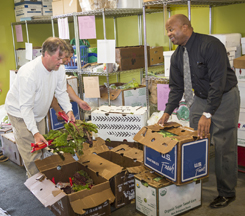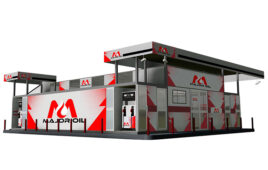“From Field to Table was specifically designed to be an earth-friendly program that helps sustain local agriculture while providing food for the hungry,” says SFNRC director of sustainability.
As a manufacturer of all-natural, 100% additive-free tobacco products, Santa Fe Natural Tobacco Co. (SFNTC) has worked hard to earn its  reputation as a strong steward of the environment.
reputation as a strong steward of the environment.
The company’s long-standing commitment to environmental sustainability has helped many tobacco farmers work their fields in ways that minimize the negative impact on the environment.
Since its founding in 1982, SFNTC has also developed a well-deserved reputation as a company that cares about communities. So the makers of Natural American Spirit tobacco products worked to develop an innovative community outreach program that’s focused on simultaneously sustaining both the planet and its people.
“From Field to Table—Sustaining Farms and Families” is a pioneering program that uses the concept of Community Supported Agriculture (CSA) to help farmers while feeding the hungry and preserving the planet.
“It’s a win-win-win program,” said Keith Grover, SFNTC’s director of sustainability. “From Field to Table was specifically designed to be an earth-friendly program that helps sustain local agriculture while providing food for the hungry.”
“The design of the program is pretty simple,” he added, “but its leverage and its beneficial effects are profound.”
Here’s how it works. Each week throughout the year, SFNTC purchases 70 shares worth of locally-grown produce from Beneficial Farms, a CSA cooperative that supports about 40 small farms in northern New Mexico and southern Colorado. Each share costs the company $25, which provides a guaranteed, consistent source of income for the farms, regardless of how good or bad the growing season happens to be.
The food the company purchases is delivered directly to The Food Depot, a Santa Fe-based non-profit organization that partners with more than 135 agencies across nine counties in northern New Mexico to provide more than 400,000 meals each month to feed the hungry.
Steve Warshawer, the founder of Beneficial Farms, says that the members of the CSA cooperative are all dedicated to growing their crops in an environmentally sustainable manner that focuses on building the soil. He noted that Community Supported Agriculture lets consumers share the costs of supporting the farms, as well as the risks and/or benefits of variable harvests. By running a multi-farm cooperative, Beneficial Farms can support many family farms while offering CSA shareholders a wider variety of produce through the year, Warshawer said. He notes that “having a diverse product mix, even in winter, makes it a more viable business.”
Sherry Hooper, the executive director of The Food Depot, said the fruit and vegetables that The Food Depot receives from Beneficial Farms (an average of about 900 pounds a week)—comes in on Thursdays and is distributed by the end of Friday. “We’ve been thrilled to see this program develop,” she said. “We’ve been mostly using it for the senior food program, delivering it to senior centers, and they’ve been really delighted to receive the produce. There’s such a difference when you bite into something that’s grown locally, versus what you buy in a store.”




